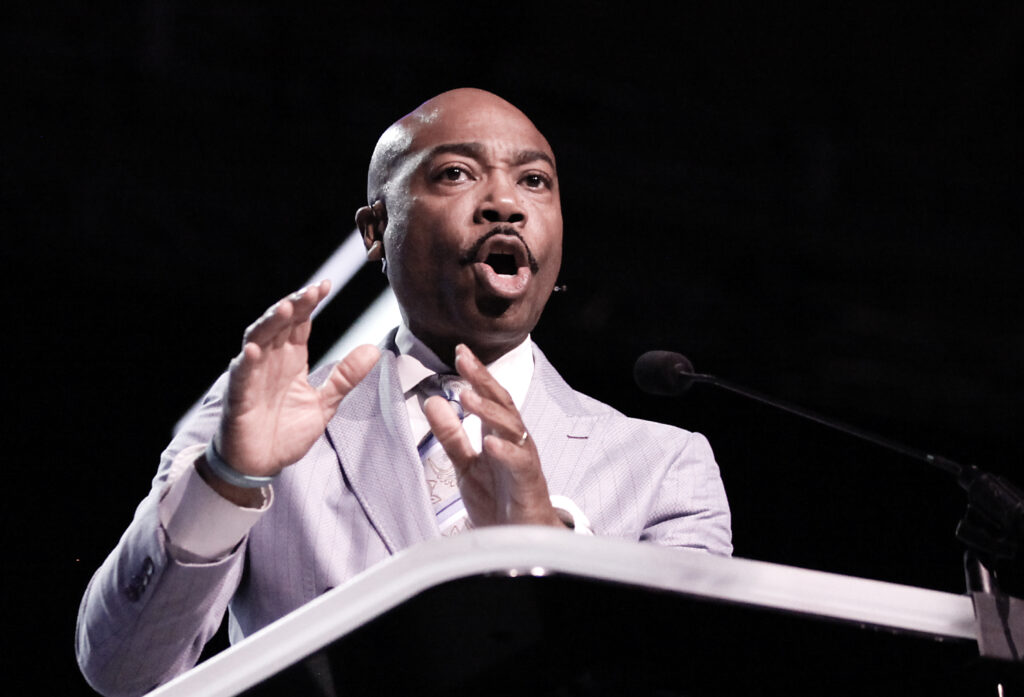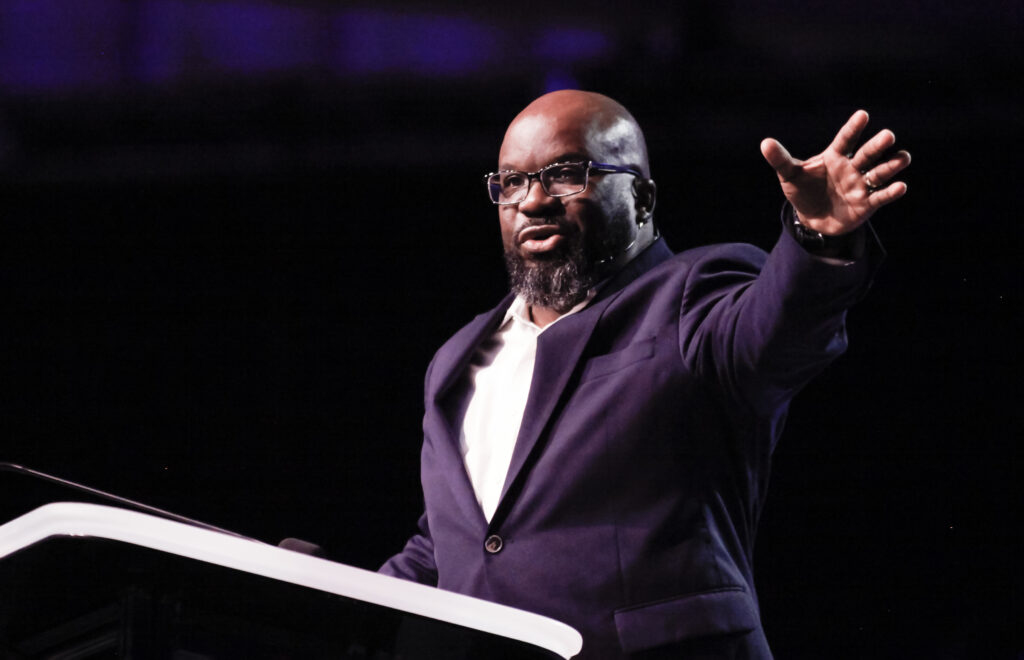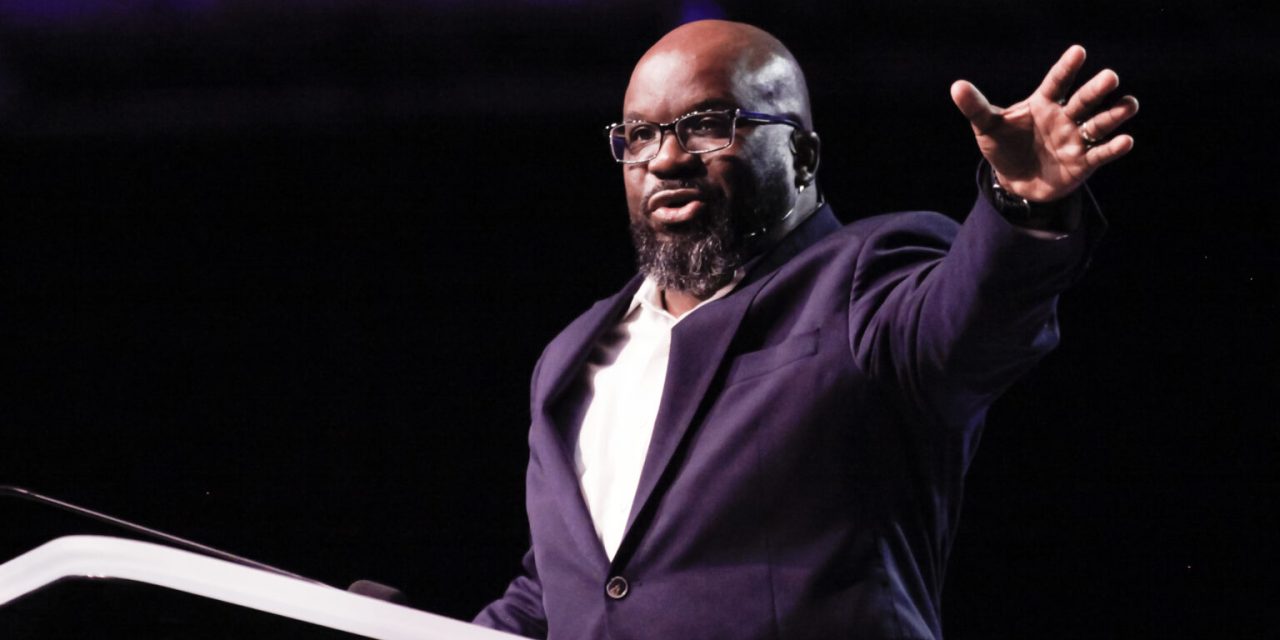
James Thomas, pastor of Epic Church in New Orleans, leads worship during a session of the 2023 SBC Pastors’ Conference in his city. Much of the meeting’s worship had the flavor of New Orleans. Photos by Luc Stringer
NEW ORLEANS (BP) – Ministry can be a discouraging profession. But blessing is available for those who will cultivate the type of character Jesus described in the Beatitudes, said speakers on day two of the SBC Pastors’ Conference June 12.

Music artist Travis Cottrell leads in worship at the two-day 2023 SBC Pastors’ Conference in New Orleans. Photo by Luc Stringer
Preachers during Monday’s sessions at the New Orleans Ernest N. Morial Convention Center included Andrew Hebert, Jim Shaddix, Bartholomew Orr, Chip Luter, D.J. Horton and H.B. Charles. They expounded the conference theme, “Beatitudes of a Pastor: Character Matters in Ministry.”
Brief pastoral talks on the Fruit of the Spirit were delivered by Michael Cloer, pastor emeritus of Englewood Baptist Church in Rocky Mount, N.C.; Ken Whitten, national director of pastoral leadership for the North American Mission Board; Gilberto Corredera, pastor of Prestonwood en Español in Plano, Texas; Phil Newton, director of pastoral care and mentoring for the Pillar Network in Wake Forest, N.C.; and Jimmy Draper, president emeritus of Lifeway Christian Resources.
Oklahoma pastor Stephen Rummage was elected president of the 2024 SBC Pastors’ Conference by acclamation.
Andrew Hebert
Hebert, pastor of Mobberly Baptist Church in Longview, Texas, preached from Matthew 5:5, “Blessed are the meek, for they shall inherit the earth.”

Andrew Hebert
A humble person is one who doesn’t always need to be the center of attention, he said. Humility is the death of the “narrow, suffocating filter” of self-focus, and it is the “nourishing, calming acceptance that you have a small place in a much larger story.”
Just as journalism has gone awry when the reporter becomes the story, Hebert said, “if we’re not careful, pastors can take center stage. Pastors can become the story.”
Hebert noted that when a phone is in selfie-mode, the flashlight cannot be used.
“If the attention is on yourself, you can’t shine the light on anything else,” he said. “Jesus has called us as pastors and ministry leaders to shine the spotlight on Jesus and Jesus alone and not to be a selfie-generation kind of pastor.”
The blessing of the Kingdom, Hebert said, “is experienced not by the powerful or those with position and platform and prominence but by those who take the posture of humility.”
Pastors can be encouraged that their ministries don’t depend on their abilities or resources.
“Jesus has everything I need, and if I will be humble enough to stop trying to be everything and do everything and know everything, and if I get hungry for Jesus to do something in my life that I can’t do for myself, then Jesus will fill me,” Hebert said. “That’s what humility will produce.”
Jim Shaddix
Pastors receive blessing from God when they long for holy lives, said Shaddix, professor of preaching at Southeastern Baptist Theological Seminary in Wake Forest, N.C.

Jim Shaddix
“Jesus blesses pastors with an eagerness for righteous living now and an expectancy of its fullness when He returns,” he said, preaching from Matthew 5:6.
When Jesus said believers must “hunger and thirst for righteousness” in the Beatitudes, He was not speaking of the imputed righteousness received in salvation or the societal righteousness of social justice, Shaddix said. Matthew used the term “righteousness” to denote “personal” and “practical” holiness.
The longing for such righteousness is God’s gift to those who have experienced new spiritual birth, Shaddix said.
Jesus was “speaking about something that the Gospel supernaturally puts inside of us,” he said. God “has deposited a desperation in your life and in my life for righteousness – something we can’t concoct on our own, we can’t muster up on our own. [It’s] something that only comes as the gracious gift of God.”
The final phrase of Matthew 5:6 (“will be filled”) is in the future tense, Shaddix said, signifying that a believer’s desire for righteous conduct will not be fulfilled entirely until heaven. Pastors should reject worldliness and joyfully anticipate their total freedom from sin in Paradise.
“Don’t throw in the towel,” he said. “Pursue this with everything you’ve got. Fan the flame. Long for righteousness, and give yourself for it because Jesus has given us everything that we need.”
Bartholomew Orr

Bartholomew Orr
Orr, pastor of Brown Missionary Baptist Church in Southaven, Miss., preached from Matthew 5:7, “Blessed are the merciful, for they shall receive mercy.” The beatitude is best lived out by Jesus in Matthew 21:12-17, Orr said, pointing to the passage where Jesus turned over the money-changers’ tables.
The merchants had upset Jesus because they were more concerned with profiting at the temple than with participating in worship, Orr said. Jesus disrupted their scheme because the sellers had lost their mercy for the worshipers.
“Could it be, brothers and sisters, that the reason why oftentimes we are not evangelistic in our outreach, that we are not attractive to others, is because we have allowed too much worldly stuff to sneak in?” Orr said. “Could it be that our churches are overcrowded, looking like the world?”
The church can become so crowded with good intentions that there’s no room for God to move, Orr said.
“We need to be careful that we don’t give ownership of the church over to individuals that are more concerned about the bottom line than they are about those who are at the bottom of the line and those who are at the back of the line,” Orr said.
By turning over the tables, Jesus in His mercy was giving people an opportunity to come to Him, and they did. Just as He did in that recorded scene, Jesus has set the table for believers today to have everything they need for life and godliness, Orr said.
Chip Luter

Chip Luter
Luter, senior associate pastor at Franklin Avenue Baptist Church in New Orleans, preached from Matthew 5:8, “Blessed are the pure in heart, for they shall see God,” emphasizing the restoration of purity to ministry.
“At some point in our ministries, we replaced the value of the ministry with the value of other things,” Luter said.
For some pastors, the pull toward impurity takes the form of resentment, pride and selfish ambition, he said.
“The character trait of the pure in heart is only portrayed by Kingdom men and Kingdom women, and it can only come from God,” Luter said. “It is lived out no matter what happens in the world.”
Purity of heart takes discipline, he said, mentioning the spiritual work of prayer and Bible study, and it should be sought in community with other believers. The pure in heart gain spiritual discernment, seeing God for who He really is, Luter said.
“In the midst of all we go through, in order to remain pure in heart, we are promised a day when we don’t have to deal with all this anymore. There is a place prepared for prepared people,” he said.
To live pure on purpose, Luter said, believers must have the same attitude as Christ, who called His followers to make disciples, not seek their own glory. They must have authenticity. Jesus built credibility with integrity and humility, Luter said. Believers also should strive to bring their actions in line with the will of God in order to be pure in heart.
D.J. Horton

D.J. Horton
Peacemaking requires a plan, and James 3:13-18 lays out that plan, said Horton, pastor of Church at the Mill in Spartanburg, S.C. Horton turned to James’ epistle to help explain the seventh beatitude: “Blessed are the peacemakers, for they will be called sons of God.”
In moments of conflict, pastors “have a choice. You can react as a human being, and many people would defend you. But you’re not just any old human being. The vast majority of you are called to be men of the Book,” Horton said. Unfortunately, some men in the office of pastor disqualify themselves from service by their “lack of gentleness.”
False peace can exist among Christians, which Horton called “peace faking.” That occurs when believers rely on worldly strategies to negotiate peace and leave Jesus out of the equation.
“The outcome of faking peace is worse than you realize,” he said. “When we attempt to fake peace with spiritual words” and “baptized motivation, then not only do we create disorder. James says wickedness flows.”
Genuine peacemaking requires cultivation of godly character, leading to an attitude that defaults toward forgiveness and grace, Horton said. He added that peace should never come at the expense of standing firm on biblical truth.
The need for peacemaking is a reality Southern Baptists should take to heart, he said.
“Friend, you don’t have an opponent in this room,” Horton said. The Convention must “decide our passion for our Savior’s words as a peacemaker are so strong on our life that we refuse to lose our focus on the mission.”
H.B. Charles

H.B. Charles
Pastors must stay the course when they are persecuted for being faithful, said Charles, pastor of Shiloh Metropolitan Baptist Church in Jacksonville, Fla.
“Hang in there, brother,” he said preaching from Matthew 5:10-12. “If you are persecuted for righteousness’ sake, you are already blessed. Congratulations. Rejoice and be glad, for great is your reward in heaven.”
Every faithful believer should expect persecution, Charles said. It cannot be avoided by withdrawing from the world, and it should not be avoided by assimilating with the world’s values.
“You must not play to the crowds,” he said. “You must be faithful to Jesus Christ no matter what the world may say or do.”
Only persecution for Christ’s sake yields blessing, Charles said. Some hardship is simply part of life in a fallen world while other hardship is a just consequence of foolish behavior. Yet being persecuted for godliness should cause Christians to rejoice.
Such persecution will draw a reward in heaven, he said. It also assures the recipient he is headed in a God-honoring direction in life. Persecuted pastors can take their burdens to Jesus because He understands.
Jesus “was persecuted for righteousness’ sake. They did the worst they could to Him. They nailed Him to the cross, but death did not have the last word,” Charles said. “On the third day, God raised Him from the dead with all power in His hands. And that crucified and risen Savior says, ‘If you are persecuted for my name’s sake, rejoice and be glad because I have everything under control.’”




